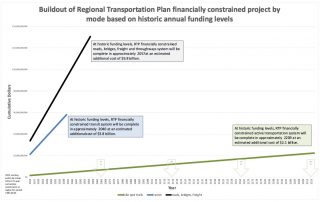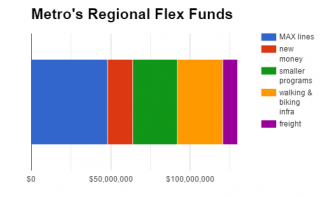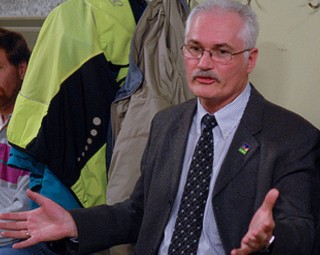(Photo: J.Maus/BikePortland)
A two-year campaign for regional funding of better biking and walking near schools, backed by the Bicycle Transportation Alliance and other advocacy groups, is in tatters.
“We got left on the cutting room floor.”
— Gerik Kransky, Bicycle Transportation Alliance
Though the most recent federal transportation bill sent $17.5 million of new flexible money to regional government Metro, Bicycle Transportation Alliance Advocacy Director Gerik Kransky said a Metro proposal circulated last Friday would dedicate none of that to the “Safe Routes” infrastructure program proposed by the BTA.
The organization had organized 3,500 residents to send postcards and emails to Metro’s elected officials in its support.
Among many attempts to demonstrate support, the coalition organized and videoed an evening meeting in East Portland where one person after another testified in five languages that they feared to walk on the streets near their homes.
Metro’s proposal might even increase the amount of money going to freight-related projects. That’s even though five of Metro’s seven elected councilors told BikePortland earlier this month that they would probably not support slicing off more of this program for motor vehicle travel when the state and region already get hundreds of millions of dollars each year for that purpose.
“These are the only sort of flexible dollars that we have in the region,” Kransky said Wednesday. “This is the wrong place to go for those new freight projects.”

At recent spending rates, the region’s active transportation network won’t be built until the year 2209. The region’s current road plans would be finished by 2057, and its mass transit plans by 2040.
Metro council could decide to veto proposal
The proposal circulated Friday could send up to $12.5 million of flexible dollars to freight projects, compared with $9.23 million if the current freight program were simply adjusted for inflation.
How could this happen even though every Metro councilor we spoke with a few weeks ago said they would almost certainly oppose dedicating a larger share of flexible money to freight?
In part, the answer is that the Metro council itself doesn’t have direct control over federal transportation spending. Instead that money is allocated by a 17-member Metro committee called JPACT, the Joint Policy Advisory Committee on Transportation, which is made up mostly of elected officials from local governments.
But the Metro council does have one bit of control over JPACT: it could vote to veto the JPACT decision and send it back for revision.
That almost never happens. Craig Dirksen, the Metro councilor who chairs JPACT (and casts the deciding vote there in the event of a tie) told us he’d be “very surprised” if the council were to override JPACT on this issue.
“The way we like to do business is we have conversations with one another and we come to consensus before we vote, so that everybody can be satisfied with what comes out of the discussion,” Dirksen said.
In other words, Metro — the only elected regional government in the country — strives to be a no-drama zone.
All the sitting Metro councilors, with the possible exception of President Tom Hughes, could be described as progressives on transportation issues. Four of the seven (Sam Chase, Carlotta Colette, Kathryn Harrington and Bob Stacey) tend to strongly support infrastructure that reduces the region’s auto dependence. But the agency’s culture of consensus (and the theoretical threat of a suburban revolt against the agency) means that officials who see ever-expanding auto infrastructure as essential to the regional economy have substantial influence, too.
The structure of JPACT also gives more influence to people who live in less populated areas. Multnomah County gets one JPACT vote for its 775,000 residents; Clackamas County gets one vote for its 395,000.
Metro vote set for April 21

The Bicycle Transportation Alliance, whose campaign for Safe Routes has been underwritten in part by the American Heart Association, does seem to have scored one much smaller victory: up to $2.1 million in new Metro support for Safe Routes programming in schools, enough to create walking and biking education and encouragement programs around the region like those the BTA currently provides in Portland schools.
Kransky said the BTA is glad to have that in the proposal, but described it as a small silver lining. The For Every Kid Coalition (led by the BTA along with Upstream Public Health, the Safe Routes to School National Partnership, Oregon Walks, OPAL Environmental Justice Oregon, the Asian Pacific-American Network of Oregon and the Community Cycling Center) had asked Metro for $15 million for Safe Routes infrastructure.
“We got left on the cutting room floor,” he said.
There’s still a possibility that Metro could de-fund its other active transportation priorities in the coming years in order to guarantee projects near schools. And it could guarantee that its upcoming transit projects include lots of walking and biking projects that help people reach transit stations.
But neither of those options would meaningfully increase the amount being spent on walking or biking — even as the region considers tying up some of its scarce flexible funds so it can take out long-term loans that would increase the amount it spends on motor vehicles.
The JPACT vote is April 21. The For Every Kid Coalition is pushing a last-ditch effort on social media to block the proposed increase in freight funding.
— Michael Andersen, (503) 333-7824 – michael@bikeportland.org
BikePortland can’t survive without subscribers. It’s just $10 per month and you can sign up in a few minutes.
The post Metro proposal rejects Safe Routes to School, spends more on freight routes appeared first on BikePortland.org.
from Front Page – BikePortland.org http://ift.tt/1M3DYrC

No comments:
Post a Comment